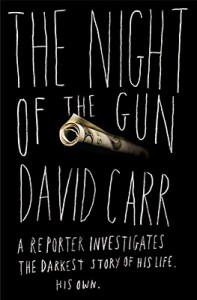
Initially, David Carr’s The Night of the Gun wasn’t a book I thought I would be interested in reading. First, the title is very Soprano-ish, second, it’s another addiction memoir and third, it’s expansive (almost 400 pages). As I started to read, I discovered that, yes the book was about his epic battle with cocaine and crack, but what I found more interesting was his attention to the fragility of memory. How our memories, even the ones we believe as solid and unbreakable, can be nothing more than our attempts to hide our personal demons propagated with our desires to be someone else, someone better. Such was the case on the night of the gun. Carr steadfastly believed that on this night of binge drinking and cocaine indulging, his friend pointed a gun at him to make him vacate his friend’s apartment. But when Carr dug deeper, it turned out his friend wasn’t the one with the gun, but Carr who wielded the .38 Special. That false memory was the tipping point for Carr’s book. As Carr stated, But if I was wrong about the gun, what else was I wrong about?
Thus began Carr’s journey, well actually more like in-depth reporting, on as what he dubbed as the darkest story of his life. As impressive as his writing was, it was not as impressive as his exhaustive reporting, documenting, video recording and transcribing of all his interviews. In the end, he recorded 19.3 gigabytes worth of material. Astonishing. All of this because he couldn’t trust his memory. He wanted to get the real story, not just his version of what he believed happened. He even hired an investigator to follow up behind him, just in case he missed any key facts. For him, Memoir is a very personal form of creation myth, and perhaps less and less truthful.
That’s what made this book brilliant. Instead of just writing about his struggle and the eventual overcoming of his addiction, Carr allowed the reader to step into his mind, to get his perspective and then flipped that perspective around, giving the reader the real truth, the really oh shit moment that truly happened. By doing this, the reader can’t help but trust that Carr is giving them the rawest, most truthful account he can provide. A couple of years ago, I read Augusten Burrough’s Dry and I thought it was a good book, although a tad bit sensationalized, about his own struggle with addiction. After reading Carr’s book, I now wonder about the validity of Burrough’s recollection. Burroughs didn’t do as nearly as much reporting as Carr did. Honestly, it’s not just Burrough’s memory that has left me in doubt, but my own as well. Carr’s book makes me question the accuracy of my memory and if what I’m writing about is really the truth, the whole truth and nothing but the truth. The only way to tell, as Carr proved, is to dig deeper, to ask those uncomfortable questions and to listen to what actually transpired.
After reading this book, I’m left with the impression, that when writing a memoir, it’s important to choose the right story but more importantly, if not more, it’s getting that story right.



I read this book to, the whole book reads like a broken piece of memory he is trying to piece up till the end. If this was made into a movie this will be one confusing movie to watch. Great read but be ready to piece it together too.
It will be interesting to see how the movie strings together his fragmented memories. I agree with you, it was overall a great read.